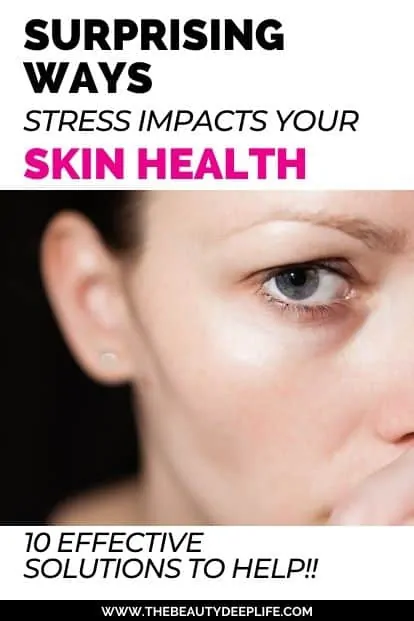
The Surprising Ways Stress Wreaks Havoc On Your Skin: 10 Health & Beauty Tips To Help!
Life can be stressful, with seemingly endless responsibilities and obligations. Bills need to be paid; mouths need to be fed, there’s work, family, and the “unexpected”…you know, the things we never really plan for but find ourselves needing to adapt to (or at the very least, just figure out a way to roll with).
Like the time I was driving, minding my own business, went through an intersection, and BAMMM!! A 15-year-old, completely ignoring her stop sign, came barreling into my car with her mother’s van. Ohhhh, the hassles of insurance & repairs…my stress levels were through the roof!! Just one of those “unexpected” things I had to roll with and adapt to.
Which brings me to the fact that we all know stress is that “BIG, Bad Enemy #1” for our bodies (cardiovascular system, digestive system, etc.) and mental wellness. But have you ever stopped to think, how it may be affecting your skin?? If not, you aren’t alone… Trust me, I never did until about 3 or 4 years ago.
But what I discovered was that while several studies have come to draw a relationship between our mind and body, so also have ideas emerged of a powerful “mind skin connection”.
The basic theory?? Your emotional and mental state can show up as an outward expression on your skin.
The result?? Stress-related skin conditions and problems!!
Disclosure: This post contains affiliate links, which means I may receive a small commission at no extra cost to you if you make a purchase using one of these links. Please see my disclosure policy for more details. As an Amazon Associate, I earn from qualifying purchases.
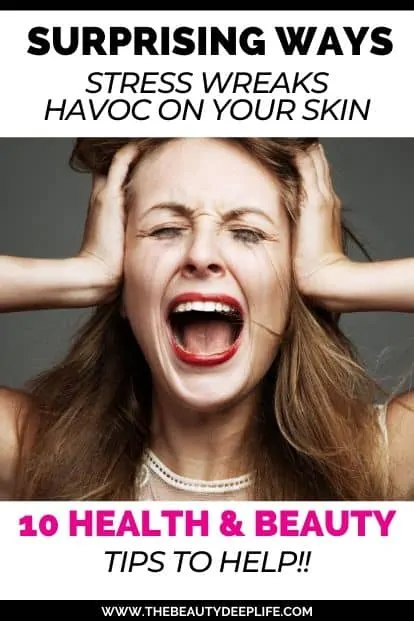
The Skin Problems Stress & Anxiety Can Cause
Ok, so perhaps, like myself, you’ve been looking in the mirror and noticing a few things you aren’t too pleased with. Maybe they sprung up overnight? Or maybe you’ve been seeing changes slowly, bit-by-bit over time??
Well, my dears, it’s highly likely those issues and concerns you’ve been lamenting are linked to your stress levels. The fact is, I had to face this “reality check” myself.
So, what are the typical skin problems and conditions caused by stress and anxiety?? Well, here’s a list of a whopping FOURTEEN different ones!! Can you relate to any of these?
- Dry Skin
- Sensitive Skin
- Minor Redness
- Irritation
- Flakey Skin
- Dull Skin
- Signs of Aging (lines & wrinkles, etc.)
- Acne
- Rosacea
- Psoriasis
- Eczema
- Dark Eye Circles
- Pale Complexion
- Slow Wound Healing
How Stress Causes These Skin Problems
When you stress, your body produces too much cortisol, which then can trigger inflammation & flare-ups (acne, redness, dryness, sensitivities, irritation, psoriasis, eczema, rosacea, etc.).
And if you are at all like I was, you may have been rather stunned to find out cortisol also accelerates your skin’s aging process!! Yep it sucks, I know! You see, cortisol breaks down the collagen in your skin, which inevitably leads to those dreaded fine lines and wrinkles.
Additionally, with stress, oxygen, blood, and vital nutrients for having healthy hair, skin, and nails get redirected to your critical organs (heart, lungs, etc.), the areas our body believes need them the most. To your body, your hair, skin, and nails just aren’t as important on the hierarchy scale, but rather, it’s the organs relied on the most to “live” that get priority!
So, your skin (along with hair and nails) misses out on some of the essential things it needs to stay healthy-looking. And for your skin, this can mean dullness, a pale complexion, and more obvious undereye circles.
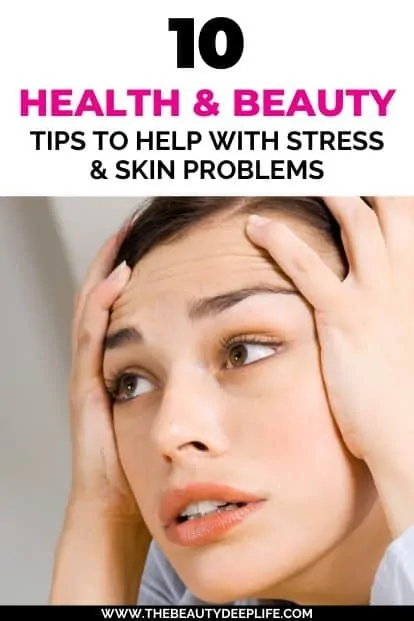
10 Best Health & Beauty Tips To Help With Stress And Skin Problems
While stress often can’t be escaped, since it just comes with the “adulting part of life”, the beautiful thing is that you can do some things about it! The key is to find ways to start managing your stress (hopefully reduce it), as well as some ways to address those skin conditions with a consistent skincare routine.
You can get your power back if you simply start practicing a few new skincare and healthy lifestyle habits. So without further ado, here are the Top 10 Health & Beauty Tips to help!!
TIP 1: Find Your Stress Triggers
First things first, figure out your stress triggers. Understanding the source is essential. And once you determine those triggers, it can become easier to brainstorm solutions.
This may require taking a good hard look at things in your life. You can even try jotting them down in a journal. One column for triggers and a second column for possible methods to relieve the stress caused by that specific trigger and/or ways to reduce or even eliminate that trigger altogether.
For example, let’s say your stress trigger is brought on by feeling short on time, and like you never have enough to get all the things you need to get done each day or each week. I’ve found that one way to reduce that stress trigger for myself is to delegate a few things and, as a result, take some items (particularly errands) off my weekly “to-do” list.
Several of my errands can be taken care of online, so by “delegating” that way, it frees up more of my time each week. Rather than going to the drugstore to get household items (cleaning products, batteries, toilet tissue, light bulbs, etc.) or beauty essentials (shampoo, conditioner, cotton swabs, etc.) I just order from my Amazon Prime account! It makes everything so convenient and effortless for me!
Don’t have Amazon Prime? You can grab a FREE 30-day trial here!
If this is a big trigger for you as well, think about to whom you could delegate some of the workload, errands, or chores? Could you use a service to help?
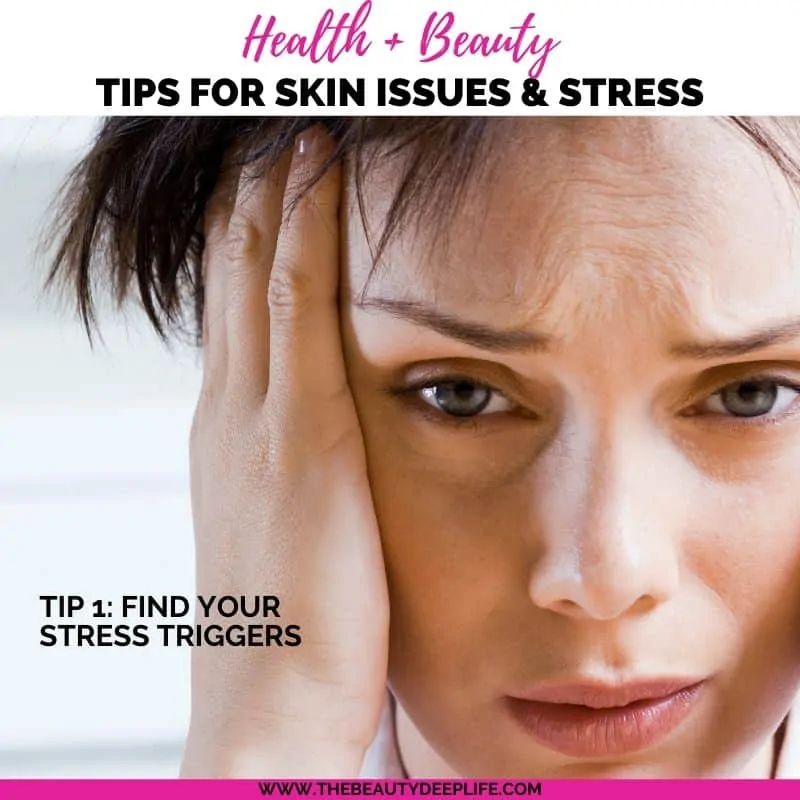
TIP 2: Schedule “Me-Time”… Pencil It In!
Designate some “me time” during your week with the commitment that it will be a designated chunk of time focused solely on taking care of YOU. Use this time to unwind, relax, de-stress, or do something that makes your heart sing. Just a few minutes a day can truly help to get your mind right!
Pull out a calendar if that helps and pencil it in! Think of it as a very important meeting with yourself. You can narrow it down to one day a week or (if you really want to maximize the impact) pick a small block of time several days a week.
TIP 3: Listen To “Weightless”
A study was done by neuroscientists in the UK to determine the best songs for reducing stress and anxiety in test subjects. According to Dr. David Lewis-Hodgson from Mindlab International, the song, “Weightless” by Marconi Union reduced the participants’ anxiety levels by 65% with a “35 percent reduction in their usual physiological resting rates”.
Apparently, the artists worked with sound therapists when creating the song, with the intent being for it to help to reduce cortisol levels in listeners. Talk about a healthy collaboration!!
A word of caution: Do not play while driving or operating heavy machinery lol…Seriously though, it will put you to sleep (at least it does for me every time I play it)!! You can listen to a sample of it here on Amazon. Prepare to become totally “zen” after you hear it!!!
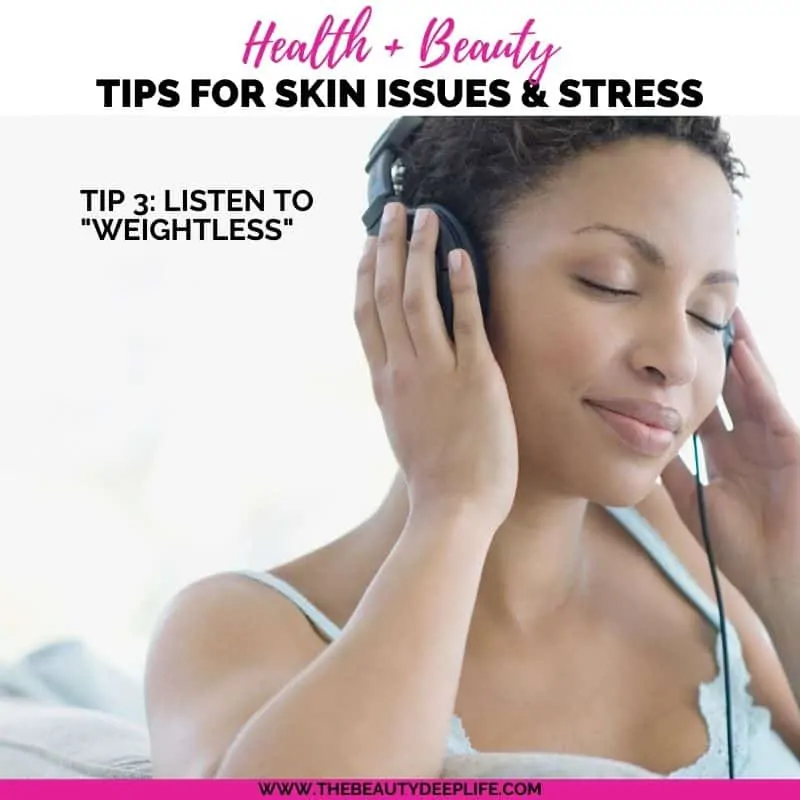
TIP 4: Get Moving!
Get out and get moving, even if just a brisk 20-minute walk or bike ride (you could also try some yoga). Exercise lowers the levels of the stress hormones your body produces like cortisol (hormone triggering inflammation, flareups, and collagen breakdown- aging skin). Aim for 3-4 days a week!!
TIP 5: Try Stress-Relief Through Aromatherapy
Aromatherapy can be an easy way to experience the mood-boosting and relaxing benefits of various essential oil scents. Try using a diffuser with a few drops of one of the following essential oils for around 20-60 minutes a day.
QUICK TIP: Most of these essential oils can be found on Amazon with FREE 2-Day Shipping for Amazon Prime Members. Not a Member? Try Amazon Prime 30-Day Free Trial.
Here are the best essential oils to reduce stress:
- Lavender – Where To Get It
- Lemongrass – Where To Get It
- Roman Chamomile – Where To Get It
- Ylang Ylang – Where To Get It
- Neroli – Where To Get It
- Bergamot – Where To Get It
- Geranium – Where To Get It
- Orange – Where To Get It
If you’d prefer an aromatherapy candle instead, try this one with ylang-ylang and chamomile, made for relieving stress and relaxing.
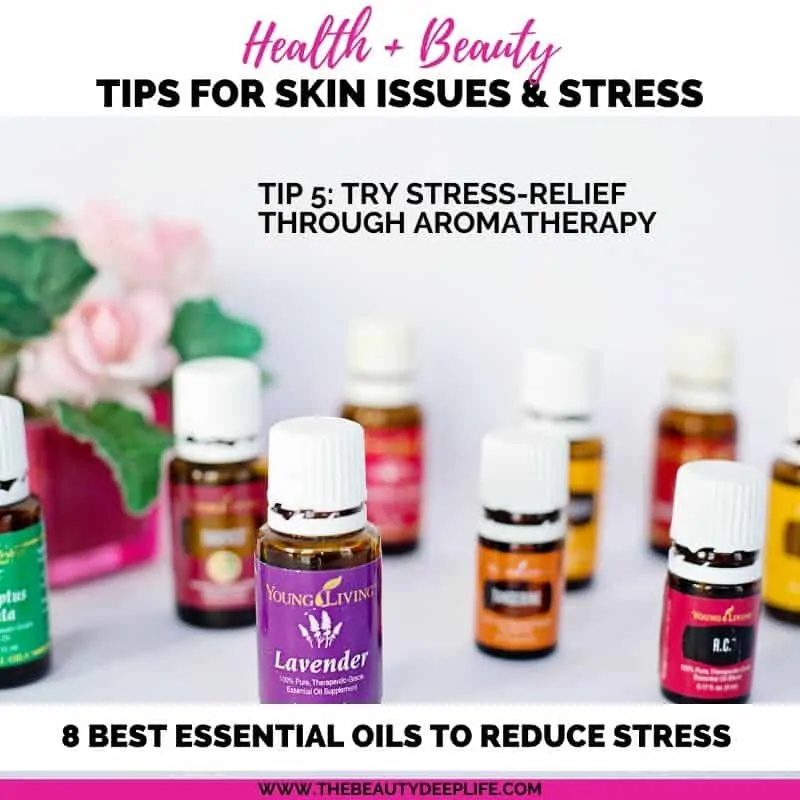
TIP 6: Find Your Tribe Or Confidant
Find a support system to help. Having someone or several people you can vent to or get advice from can make a world of difference.
In fact, for women, in particular, spending time with peers and friends has been proven to increase the release of oxytocin, known to reduce stress by reducing cortisol levels (according to NCBI).
TIP 7: Give “Beauty Therapy” A Try
Beauty treatments and routines that rely on touch can also trigger oxytocin in the brain. This chemical helps the body to relax and reduces cortisol levels.
So, schedule a spa session for a massage, manicure, or pedicure. Or if you’d rather, you can just arrange an at-home beauty session for yourself one night this week…a bubble bath, detox bath, hair mask, or maybe just give yourself a little facial!
Surprisingly, even simple beauty sessions at home can be very therapeutic. (I love a nighttime beauty session myself… It can be so relaxing!)
Learn more about how self-care in the form of a simple beauty routine can help with not only stress management but anxiety and depression too.
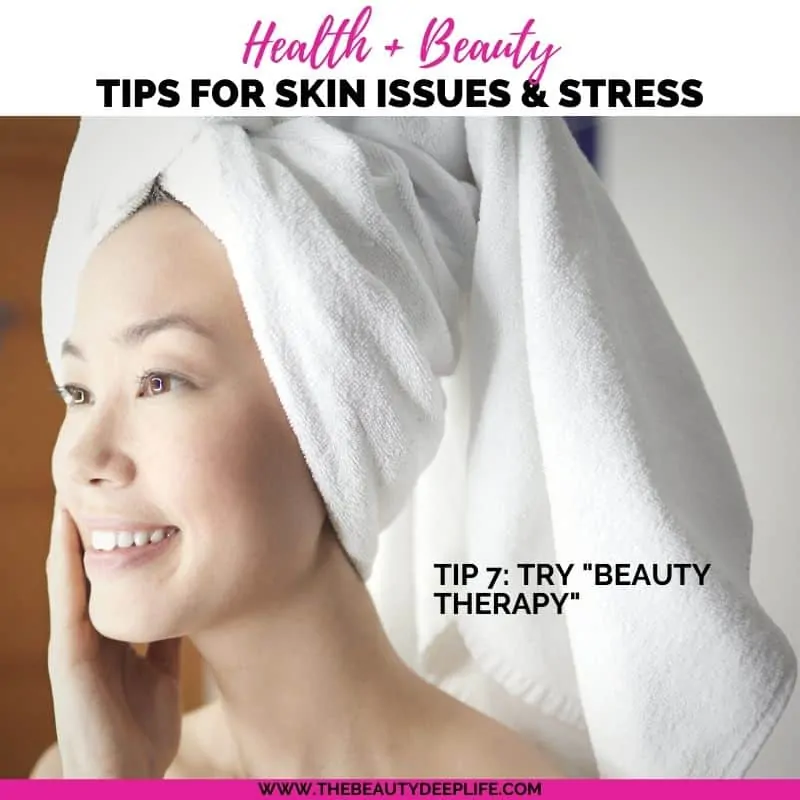
TIP 8: Consider Eating Stress & Anxiety Reducing Foods
When it comes to nutrition, there are two foods you should consider adding to your diet for stress & anxiety relief! The good news is they are yummy too!!!
Bananas
- Bananas are a source of Vitamin B6, which is very good for the brain. It helps your body naturally produce serotonin (stress lowering chemical), which improves your mood.
- They are also a natural beta-blocker source. Beta-blockers are usually found in medications used for those suffering from anxiety or high blood pressure. But they can be found in some healthy food sources as well.
- Bananas are also rich in potassium, which helps to lower blood pressure, normalize the heartbeat, and send oxygen to the brain. Usually, when under stress, our potassium levels drop and become depleted.
- Lastly, they contain magnesium, which aids with serotonin production, assists the nervous system, and helps to relax & calm your nerves.
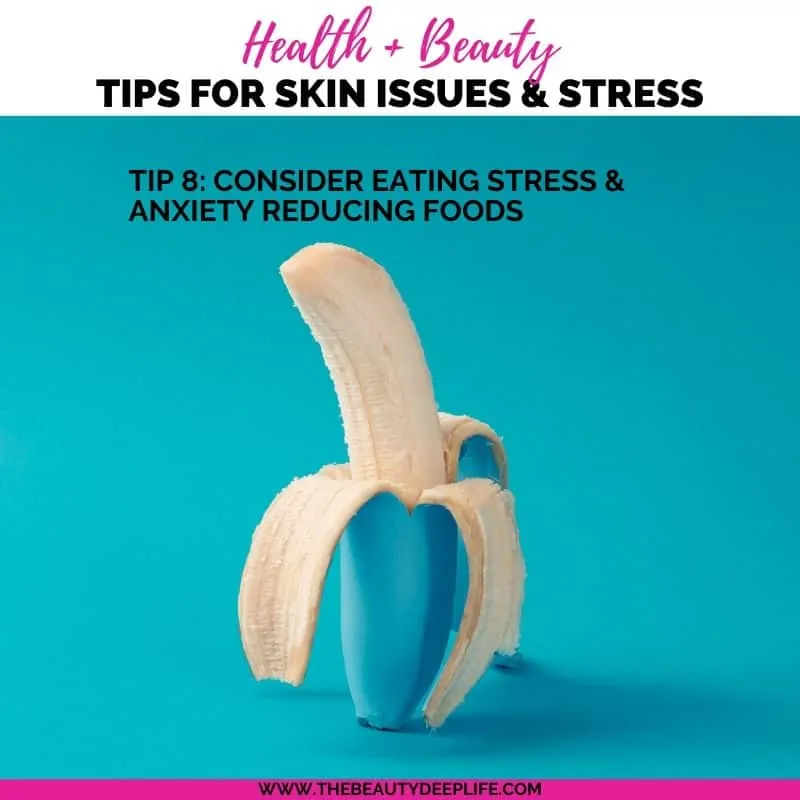
PRO TIP: Another fruit that can help…oranges!! Eating or even just smelling an orange is said to decrease stress by over 70%. Additionally, Vitamin C assists with lowering cortisol levels.
Avocados
- Avocados are a great source of several B Vitamins that aid the nervous system and help with stress relief.
- They also have folic acid, which assists with maintaining serotonin levels, thus improving the mood.
- They are rich in Omega-3 fatty acids that help with reducing hormone surges.
- Finally, avocados contain more potassium than bananas, which again helps to lower blood pressure, normalize the heartbeat, and send oxygen to the brain.
TIP 9: Catch Some ZZZZ’s
It’s highly likely if you have been stressed, you have also been experiencing a few sleepless nights. Often with stress, we find ourselves lying in bed worrying and thinking things over. Hence, the quantity and quality of our sleep often suffer.
Did you know that when you are sleep-deprived, your body produces even more cortisol??!! Talk about a vicious cycle!!
Also, when you sleep, your body produces HGH (human growth hormone), which helps with the collagen, elastin, and cell turnover of your skin. So, focus on getting a full night’s sleep every night (7+ hours).
Do you struggle with falling asleep & staying asleep through the night?? Check out our tips for getting a better night’s rest here!!
Tip 10: Treat The Skin By Consistently Using A Skincare Routine With Ingredients Backed By Science
**First, let me say, if you suffer from psoriasis, eczema, or rosacea, stress is often the culprit of those flare-ups you’re experiencing. Therefore, I would suggest you use the previous tips to help reduce stress in your life.
However, for treatment options, you should consult with a doctor, as options can vary from taking oral medication to in-office treatments (light therapies), to applying prescription-level topical products.
But, if your skin concerns fall into one of the following categories, keep reading…
- Dry Skin
- Sensitive Skin
- Minor Redness
- Irritation
- Flakey Skin
- Signs of Aging (lines & wrinkles, etc.)
- Acne
- Pale Complexion
- Dull Skin
- Dark Eye Circles
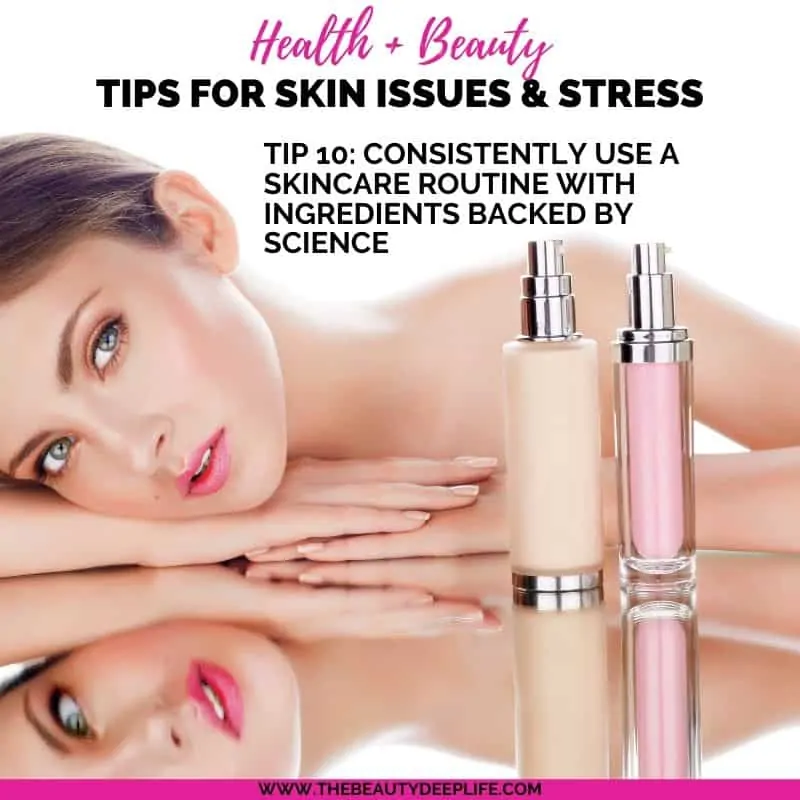
For everyone else, in addition to the previous methods & tips for coping with stress, you want to consider using products to assist in reversing some of the damage and negative impact stress has made on your skin.
Of equal importance is using those products in a skincare routine consistently. Additionally, you want to make sure those products contain ingredients that have been proven through science to be the best for tackling your specific skin issues & concerns.
To help, I have broken down a few suggestions that doctors and dermatologists recommend a few things that you may want to try adding to your skincare routine.
Stress & Dry, Sensitive, Flakey, Red, Or Irritated Skin
Unfortunately, stress can affect the barrier of your skin, causing it to become compromised and weakened. As a result, moisture escapes, and irritants or allergens can easily enter. This is how we can often end up with dry skin, sensitive skin, flakiness, irritation, and/or redness.
Additionally, when we are stressed, a “fight or flight” response is initiated in our bodies. This causes adrenaline levels to increase. And that adrenaline can make your skin lose its water content at a much faster rate, resulting in dehydrated skin.
WHAT WILL HELP:
- Using your skin products, the ultimate goal is to repair that barrier, so you keep the irritants out and the moisture (water) in. Look for the following ingredients on your product labels, dimethicone, lipids, allantoin, and ceramides, as they will help with the repair process.
- Your secondary goal is to boost the hydration in your skin. You should look for products (serums & moisturizers) that contain humectants like hyaluronic acid or glycerin. They help pull moisture from the air and draw it into your skin.
- For sensitive, irritated, or red skin, you want to also focus on calming and soothing your skin. Ingredients like oatmeal, chamomile, and aloe vera can sometimes help. You should also avoid sudsy cleansers and go for something gentle, cream-based, and fragrance-free.
Stress & Skin Aging
It’s essential to use products that will both diminish signs of aging and help prevent signs of aging. This way, you are covered from all angles!!!
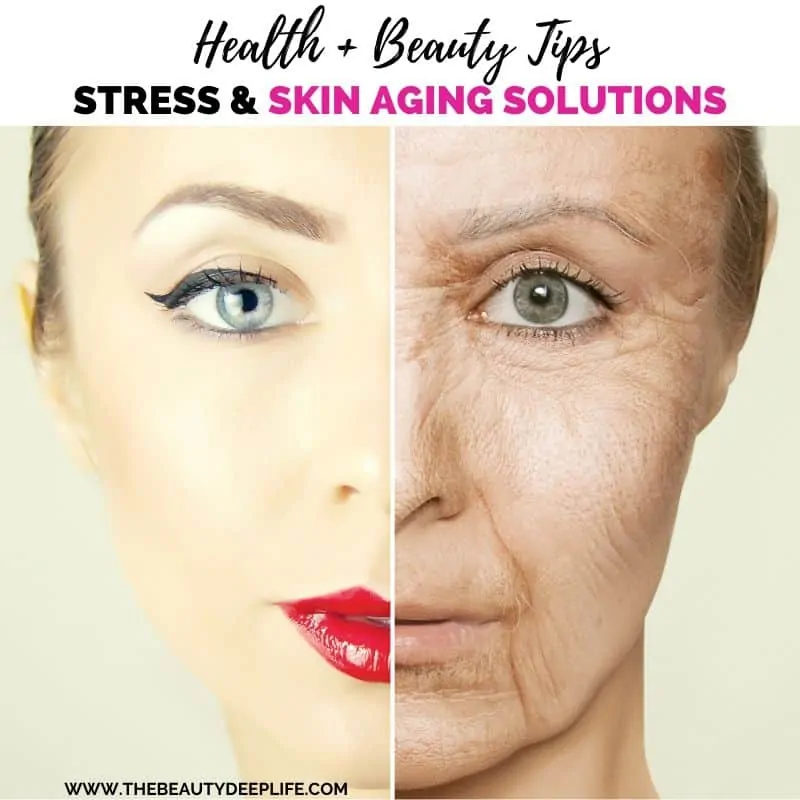
WHAT WILL HELP:
- Look for skincare products (serums and moisturizers) with moisture-boosting ingredients, as they will help to plump up those fine lines (hyaluronic acid & glycerin).
- Also, look for anti-aging ingredients that increase collagen, fight free radicals (these breakdown collagen & elastin in your skin), and/or help with skin cell turnover. Consider products with Vitamin C (fights free radicals and boosts collagen), glycolic acid (cell turnover), peptides (collagen), or retinol (cell turnover and help with reducing the breakdown of collagen).
- Lastly, always wash your makeup off at night and don’t skip your nighttime skincare routine!! Read how skipping a nighttime skin routine could be the biggest mistake you ever make for your face.
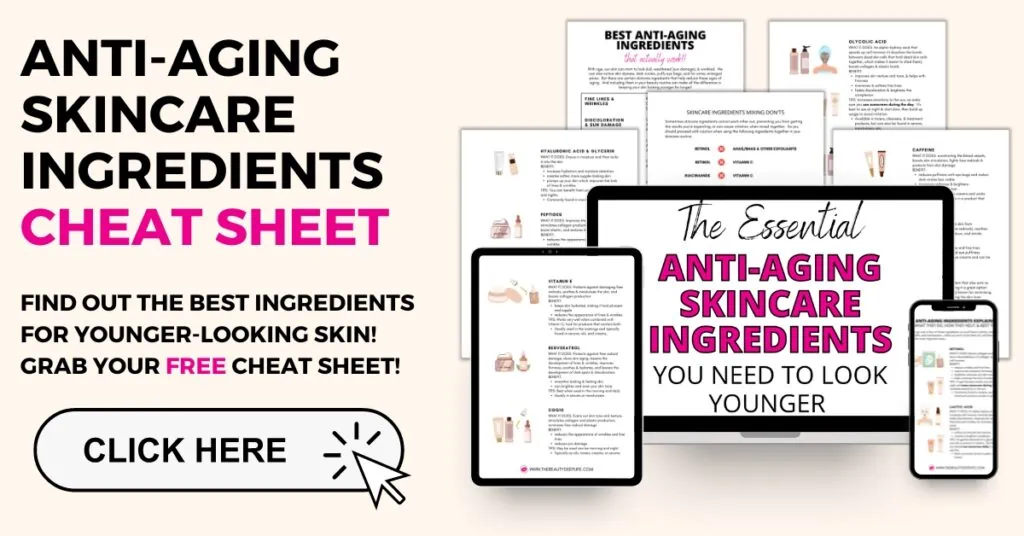
For more anti-aging beauty tips, learn how you can use makeup to look younger using your brows and lips!
Stress & Pale Or Dull Skin
As mentioned at the beginning of this article, your body diverts blood, oxygen, and nutrients to your most important organs during phases of intense stress. While your skin will still get some of these things, the amount is significantly less since your body has gone into that “fight or flight” mode. And with less blood flow to the face, it can look pale, sallow, and dull.
What’s the opposite of pale dull skin?? Healthy, bright, and glowing skin!! So with that in mind, here are some options to assist…
WHAT WILL HELP:
- Give some gentle exfoliation at try! Exfoliating will rid the surface of your face of excess dead skin cells that may be contributing to that dullness. The massaging-like motion will improve circulation and blood flow, bringing some rosiness back into your face.
- Along with exfoliating, you want to look into adding more hydration to your skin for a dewy, healthy, effervescent glow. Using a product (serum or moisturizer) with hyaluronic acid can help as it draws water from the atmosphere into your skin!
- Also, consider trying products with brightening ingredients to help with dullness like Vitamin C, kojic acid, licorice extract, mulberry extract, or niacinamide.
Stress & Acne
For acne, it’s likely the increase in cortisol and adrenaline from stress, has precipitated those new, unwanted blemishes. The increase in both of these can make your skin produce more oil, eventually leading to blocked pores and pimples.
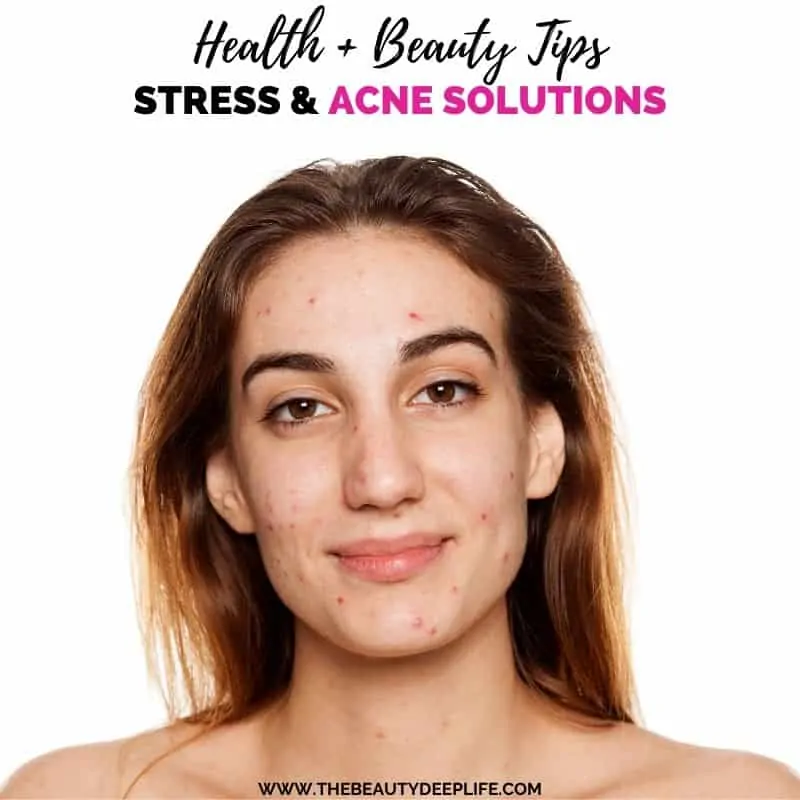
Read more tips on acne causes, bad habits, and ways to stop breakouts.
WHAT WILL HELP:
- Focus on using a cleanser twice a day to clean pores and remove that excess oil.
- Use ingredients that help with acne inflammation and swelling like sulfur. This can often be found in cleansers or treatment pastes.
- Try to include benzoyl peroxide, as it kills the bacteria that leads to acne.
- Lastly, use products with ingredients geared towards keeping your pores clear of dead skin cells too. Dead skin cells combine with excess oil and cause plugs in your pores that result in breakouts. The best ingredients to help with this are ones like salicylic acid, sulfur, and/or retinol.
Stress & Dark Eye Circles
Since you have less blood flow to the face and a paler-looking complexion, the blood vessels that are under your eyes can also seem more visible (it’s those blue and purple veins peeking through).
WHAT WILL HELP:
An eye cream with targeted ingredients!! Look for the following ingredients the next time you scoop up an eye cream!!
- Caffeine to make the blood vessels constrict and ultimately less visible.
- Peptides to help firm and thicken up the thin skin under your eyes, so the blood vessels don’t show through as easily.
- Brightening ingredients like Vitamin C or Vitamin A (retinol).
For more beauty remedies (makeup & skincare) to specifically help with dark eye circles, check out this post!
Struggling with puffiness and eye bags?? Here are some makeup, skincare, and lifestyle tips to help!
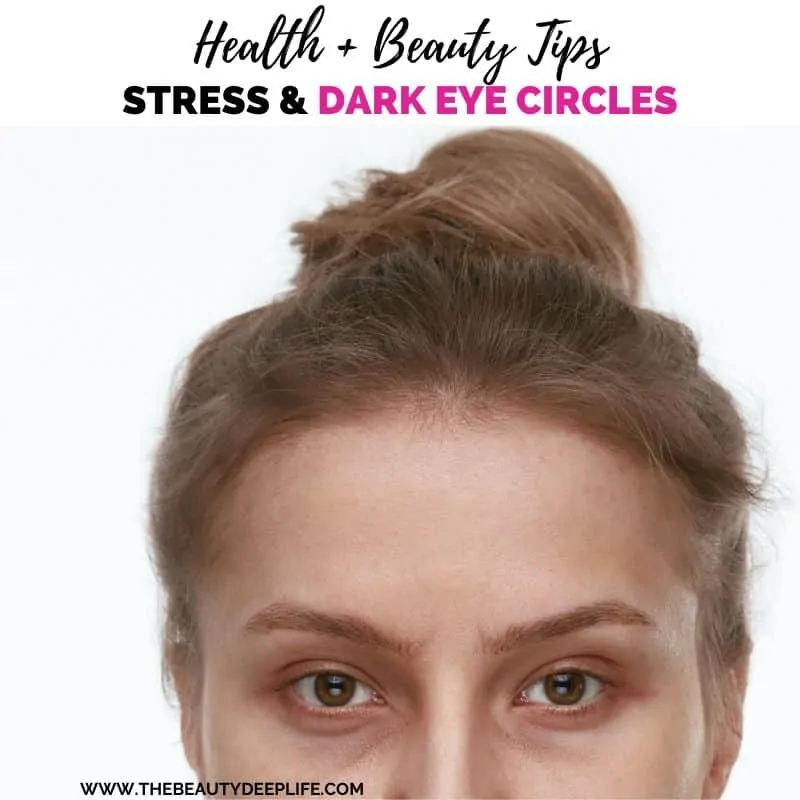
Stress & Skin Health: The Wrap-Up!
Well, as you now see, stress can rather massively impact our skin, from acne to premature aging, dullness, dark undereye circles, redness, sensitivity, dryness, to even more serious conditions like psoriasis, rosacea, and eczema.
But the wonderful thing is you do have control over the situation, and implementing a skincare routine along with a few methods to reduce your daily stress can significantly help!
Try a few of these tips and see what works for you. Also, when you try Tip#3, lol…I dare you not to fall asleep listening to it! 😉
Now We Want To Hear From You!! Do you have any tips for reducing stress and anxiety?? Leave a comment below, would love to hear what works for you!
Related Articles:
- The Best Guide to Women’s Essential Skincare Tips
- 7 Ways To Relieve Stress & Anxiety Right Now
- Big Beauty Mistake: Why You Should Never Skip A Nighttime Skin Routine
- How To Have Healthy Glowing Skin: 7 Expert Tips
- Incredibly Simple Ways To Hide Dark Circles
We are a participant in the Amazon Services LLC Associates Program, an affiliate advertising program designed to provide a means for us to earn fees by linking to Amazon.com and affiliated sites. For more info, see Disclosure Policy.

very useful
thanks!
very informative
thanks for sharing
Thank you so much for sharing such amazing content.this is such great and helpful information. your content is literally always great and we have been following them a lot. please keep sharing information like this.
Thank you for sharing this! Love the content, very informative.